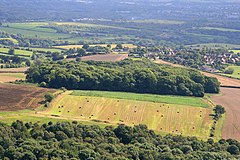Little Wenlock
| Little Wenlock | |
|---|---|
 The Old Quarry Plantation and Little Wenlock, seen from the Wrekin |
|
|
Little Wenlock shown within Shropshire
|
|
| Population | 605 (2011) |
| OS grid reference | SJ645068 |
| Civil parish |
|
| Unitary authority | |
| Ceremonial county | |
| Region | |
| Country | England |
| Sovereign state | United Kingdom |
| Post town | TELFORD |
| Postcode district | TF6 |
| Dialling code | 01952 |
| Police | West Mercia |
| Fire | Shropshire |
| Ambulance | West Midlands |
| EU Parliament | West Midlands |
| UK Parliament | |
Little Wenlock is a village and civil parish in Shropshire, England. The population of the civil parish at the 2011 census was 605. It was mentioned in the Domesday Book, when it belonged to Wenlock Priory. Ancient habitation is attested by the discovery of two caches of Bronze Age weapons.
The village is situated two miles west of Dawley, a market town now part of Telford.
Nearby is the 1335-foot-high Wrekin, one of Shropshire's iconic hills with an ancient hill fort. Part of it falls within Little Wenlock parish, while the adjoining parts fall into other parishes.
The name "Wenlock" as found in Much Wenlock and Little Wenlock (and also Great Wenlock, a now obsolete name, but found in some historic sources) is probably derived from the Old English *Wenan loca meaning "Wena's Stronghold" (wéna being feminine and meaning "hope") The town was recorded in the Domesday Book as Wenloch. The "Little" of the name distinguishes it from the larger settlement and market town of Much Wenlock, which is situated several miles to the south, on the other side of the River Severn.
11-year-old Alice Glaston from Little Wenlock was hanged together with two men in Much Wenlock on 13 April 1546, for an unknown crime. She is the youngest known girl legally executed in Great Britain.
The village features a public house (the "Huntsman Inn") and a village hall.
...
Wikipedia

